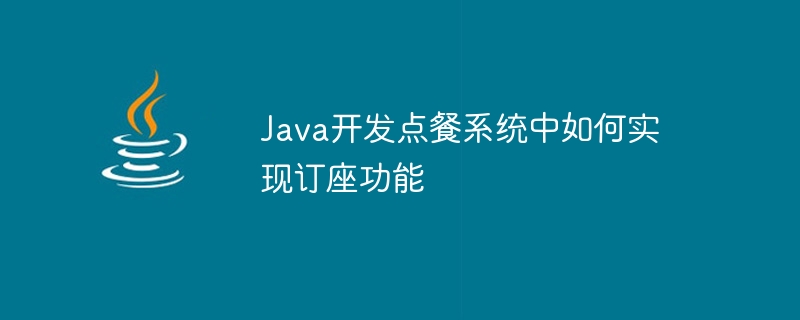Home >Java >javaTutorial >How to implement reservation function in Java development ordering system
How to implement reservation function in Java development ordering system
- PHPzOriginal
- 2023-11-02 18:16:57889browse

How to implement the reservation function in Java development of ordering system
With the rapid development of the Internet and mobile technology, the ordering system has become an important part of the catering industry. Customers no longer need to go to the restaurant in person, they can easily order food through mobile phones or the Internet and choose a table that suits them. For restaurants, providing a reservation function can better manage the dining process and improve service quality and efficiency.
In order to realize the reservation function, we can use Java technology and features to develop a powerful and easy-to-use ordering system. The following are some suggestions for implementing the reservation function in Java development:
- Database design: First, we need to design a database to store customer reservation information. The database table can include table information (including table number, maximum occupancy, availability, etc.), reservation records (including reservation time, reservation person's name, contact information, etc.), etc.
- User Interface: Develop a user-friendly interface that allows customers to intuitively select restaurants, tables, and meal times. A better user experience can be provided via a drop-down menu or calendar selector. In addition, some auxiliary functions can also be implemented, such as displaying the number of available tables and providing recommended seating options.
- Booking logic: During the booking process, there are some logical rules that need to be considered. For example, a table can only be booked by one customer at the same time, a customer can only book one table at the same time, etc. By writing corresponding code, these rules can be checked in the background logic and processed accordingly.
- Reservation confirmation: After the customer successfully reserves a table, the system should send a confirmation message to the customer's mobile phone or email. This step can be implemented using Java's email sending function or SMS sending function.
- Administrator Interface: Develop an administrator interface so that restaurant managers can easily manage reservation information. Administrators can view the current reservation status, modify table information, manually add or cancel reservations, etc. In addition, statistical functions can be added to the administrator interface, such as counting daily, weekly, monthly bookings, etc.
- Reservation Reminder: When the reserved dining time approaches, the system can send reminders to customers via text messages or push messages. This avoids empty tables due to customers forgetting their meal times.
- Cancel reservation: If the customer needs to cancel the reservation, the system should provide a corresponding interface so that the customer can easily cancel the reservation. After canceling a reservation, the system should mark the corresponding table as available.
Through the above steps, we can implement the reservation function in the ordering system developed in Java. This function will help restaurants provide better services, improve dining efficiency, and also facilitate customers' dining arrangements. During the development process, user interface design, database design, and backend logic writing need to be comprehensively considered, as well as coordination with other modules.
Of course, implementing the seat reservation function is only a sub-function of the ordering system, and there are many other functions that need to be considered and implemented. Therefore, during the development process, it is necessary to comprehensively consider various factors, flexibly use Java technology, and make adjustments and optimizations according to actual needs. Only by continuous learning and innovation can we develop high-quality software that meets user needs.
The above is the detailed content of How to implement reservation function in Java development ordering system. For more information, please follow other related articles on the PHP Chinese website!
Related articles
See more- Implement WeChat mall order management in PHP
- PHP development to build an enterprise resource planning (ERP) system with sales order management functionality
- How to use PHP to develop a simple order management function
- How to implement takeout order management in Java development ordering system
- How to implement user personal center and order management functions in the grocery shopping system?

